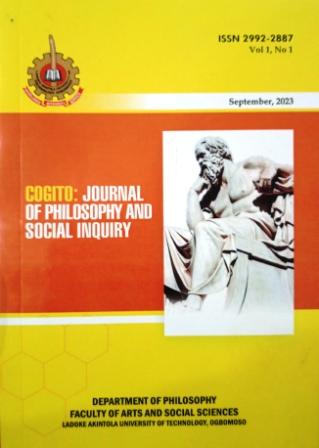The challenge of tradition and modernity has been a subject of debate since Africa's contact with the western colonialists. The continuous forces of globalization have not helped the dilemma in any way. While many scholars have advocated for a glorified traditional past of the African people, some have continually formed a romance with postmodernism, which has been entrenched by globalization. It is this dilemma that Gabriel Okara called '...turned between the dagger of the piano and the drum... in his poem. Jonathan Aminu Abbass tried to see how African traditional moral values can form a peaceful harmony with western culture in this era of postmodernism. He concludes by emphasizing the need to strike a balance between African tradition and modernity.
The epistemic problem of what truth entails and the notions of certainty were interrogated by Funmilayo Arinola Ade-Ali. The paper examines the philosophical trajectory of the problem of truth from the platonic age to contemporary times. The work x-rays various criteria for ascertaining 'what is truth' and how one can know a thing for certain. The epistemic problem of certainty was critically interrogated. The paper affirms that for a thing to constitute knowledge, it must have the attributes of truthfulness and certainty.
The relative nature of value judgement in African society was x- rayed in a comparative manner with the Immanuel Kant subjective assessment of value in aesthetics by Babatunde Oni. While the historical origin of Africans prioritizes the community over the individual, which has resulted in several debates within the African worldview, Oni tried to see how individual autonomy, as championed by Kant in his critique of Judgement, can be used to reposition African social order and bring the individual and communal debate to an end.
Nigerian society is such that it has witnessed so many ups and downs post-independence, most especially in the judicial arm of the country. While some still believe in the judiciary as the last hope of the masses, very many have lost faith in the judiciary. It is upon this bedrock that the research work of Garuba, Rasheed Obasekore, et al. attempts to critically evaluate the Nigerian judicial system. The paper unravels some flaws in the Nigerian judicial system and also prescribes a needed pathway for the repositioning of the 3" Arm of Government in Nigeria.
The papers in this journal address mostly existential issues within African societies and try to forge a path to greatness for the African continent. The essays are thought-provoking and subject to continuous re-evaluation. The editorial team of Cogito is deeply grateful for the unwavering contribution of the authors to the success of the maiden edition of this journal.
Temisan Ebijuwa
Professor of Philosophy
Ladoke Akintola University of Technology, Ogbomoso, Oyo State

COGITO: JOURNAL OF PHILOSOPHY AND SOCIAL INQUIRY Vol 1, No.1 September, 2023 - ISSN 2992-2887
1.
SARTREAN EXISTENTIALISM AND YORUBA PHILOSOPHY: INTERROGATING DIVERSE PATHS TO FREEDOM AND HUMAN DESTINY by Temisan’ EBIJUWA, PhD Department of Philosophy, Ladoke Akintola University of Technology, Ogbomoso, Nigeria - tebijuwa@lautech.edu.ng
Page 1- 23
https://drive.google.com/file/d/18evQn_nDpvZX18bJnCikmw0ANsALFExw/view?usp=sharing
2.
A Re-Evaluation of Death and Celebration of Life in Contemporary Yoruba Society by Sunday Layi OLADIPUPO, PhD Department of Philosophy, Adekunle Ajasin University, Akungba Akoko, Ondo State, Nigeria E-mail: layi.oladipupo@aaua.edu.ng ORCID: 0000-0002-7914-5856
Page 24 - 40
https://drive.google.com/file/d/1VkZX8FNBTK2XNbGBeGzT9i9dDT6JntHu/view?usp=sharing
3.
A Discourse on Kantian Aesthetic and African Social Order by ONI, Babatunde Olatunji, Department of Philosophy, Ladoke Akintola University of Technology, Ogbomoso, Nigeria booni24@lautech.edu.ng
Page 41 - 54
https://drive.google.com/file/d/14ezD8aT3yrGIt30kiem3u-9OhaApdVIp/view?usp=sharing
4.
African Moral Philosophy in the Era of Postmodernism: Reconciling Tradition and Modernity by Jonathan Aminu Abbas, PhD, Baptist Theological Seminary, Kaduna. abjo12345@gmail.com
Page 55 - 77
https://drive.google.com/file/d/10qbjFS_5GopoeHTIFDsWNEAPlSy_UXk4/view?usp=sharing
5.
A BIBLICAL INTERROGATION OF SARTRE’S CONCEPT OF FREEDOM by AKINOLA, Festus Adegboyega (PhD), The Nigeria Baptist Theological Seminary, Ogbomosho
Page 78 - 107
https://drive.google.com/file/d/1Rd_OLlV4k4F_zgmfmwbTHUhE_CIr6r14/view?usp=sharing
6.
Techniques of Reinventing Judicial Integrity for Good Governance in Nigeria by GARUBA, Rasheed Obasekore Ph.D Department of Political Science & Public Administration, Fountain University, Osogbo, Nigeria, ZUBAIR Ganiyu Adebayo Ph.D Department of Political Science, Summit University, Offa, Nigeria, MUSTAPHA, Hawa Oluwatoyin - Department of Public Administration, Federal Polytechnic, Offa Nigeria
Page 108 - 125
https://drive.google.com/file/d/1u-wY-ofgbZaikzOm-JESrrgYGUx2dJvr/view?usp=sharing
7.
‘LET BEINGS BE’: HEIDEGGER AND ECOLOGICAL THINKING by 1 Aanuoluwapo Fifebo SUNDAY, Ph.D, Landhaus Fellow, Rachel Carson Center for Environment and Society, Ludwig Maximilian University of Munich, Germany. Email: Aanuoluwapo.Sunday@rcc.lmu.de, 2Department of Philosophy, Adekunle Ajasin University, Akungba-Akoko, Nigeria., aanuoluwapo.alafe@aaua.edu.ng
Page 126 - 148
https://drive.google.com/file/d/1B6V9sNL3kgPBUx0fJan4yWlIV0iuYcs_/view?usp=sharing
8.
On the Problem of Truth and Certainty in Epistemology: A Conceptual Consideration by ADE-ALI, Funmilayo Arinola, PhD, Department of Philosophy, Olabisi Onabanjo University, Ago-Iwoye, Nigeria. ade-ali.funmilayo@oouagoiwoye.edu.ng
Page 149 - 171
https://drive.google.com/file/d/1VLhQHN1gW97oLnDQ30cbEeNwotbmc7Ki/view?usp=sharing
